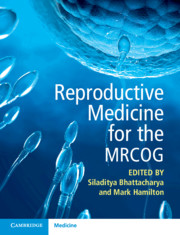Book contents
- Reproductive Medicine for the MRCOG
- Reproductive Medicine for the MRCOG
- Copyright page
- Contents
- Contributors
- Chapter 1 Epidemiology and Initial Assessment of the Infertile Patient
- Chapter 2 Disorders of Ovulation and Reproductive Endocrine Disorders Associated with Infertility
- Chapter 3 Endometriosis
- Chapter 4 Uterine and Tubal Causes of Infertility
- Chapter 5 Andrology and Infertility
- Chapter 6 Unexplained Infertility
- Chapter 7 Assisted Reproduction
- Chapter 8 Adjuvants in Assisted Reproduction
- Chapter 9 Laboratory Procedures for Assisted Reproduction
- Chapter 10 Fertility Preservation
- Chapter 11 Third-Party Reproduction
- Chapter 12 Managing Ethical Dilemmas in Reproductive Medicine
- Chapter 13 Evidence-Based Reproductive Medicine
- Chapter 14 The Organisation of Services and Quality Assurance in Fertility Practice
- Index
- References
Chapter 7 - Assisted Reproduction
Role in the Management of Infertility
Published online by Cambridge University Press: 25 February 2021
- Reproductive Medicine for the MRCOG
- Reproductive Medicine for the MRCOG
- Copyright page
- Contents
- Contributors
- Chapter 1 Epidemiology and Initial Assessment of the Infertile Patient
- Chapter 2 Disorders of Ovulation and Reproductive Endocrine Disorders Associated with Infertility
- Chapter 3 Endometriosis
- Chapter 4 Uterine and Tubal Causes of Infertility
- Chapter 5 Andrology and Infertility
- Chapter 6 Unexplained Infertility
- Chapter 7 Assisted Reproduction
- Chapter 8 Adjuvants in Assisted Reproduction
- Chapter 9 Laboratory Procedures for Assisted Reproduction
- Chapter 10 Fertility Preservation
- Chapter 11 Third-Party Reproduction
- Chapter 12 Managing Ethical Dilemmas in Reproductive Medicine
- Chapter 13 Evidence-Based Reproductive Medicine
- Chapter 14 The Organisation of Services and Quality Assurance in Fertility Practice
- Index
- References
Summary
Assisted reproduction technology (ART) encompasses fertility treatments which require manipulation of oocyte, sperm or both in vitro. This chapter aims to provide an overview of ART, including indications for treatment as well as the procedures involved. This will also include complications of ART as well as the evidence assessing the perinatal outcomes of children resulting from ART.
Keywords
- Type
- Chapter
- Information
- Reproductive Medicine for the MRCOG , pp. 68 - 81Publisher: Cambridge University PressPrint publication year: 2021



